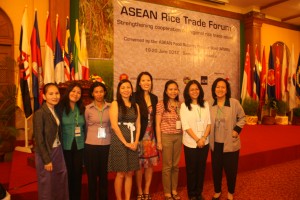AFA actively participated in the 1st ASEAN Rice Trade Forum in Siem Reap, Cambodia last June 19-20, 2012 through its delegation composed of Ms. Chey Sivat and Ms. Kong Sokchhoin, FNN Board Member and Program Coordinator respectively, together with Ms. Lany V. Rebagay, AFA’s policy advocacy officer.
The ASEAN Rice Trade Forum sought to serve as a platform for promoting coherent and coordinated policy actions on rice trade to advance the goal of food security in the ASEAN region.
The Forum brought together representatives of the ASEAN Member States and various stakeholder groups to collectively
• share, analyze and disseminate rice market information;
• identify areas of cooperation and policy coordination to mitigate or avoid extreme rice price volatility; and
• determine long-term and strategic policy reforms for the sustained development of regional rice trade.
The theme of the first forum focused on managing the risks of extreme rice price volatility caused by policy shocks and supply distortions through coherent and coordinated policy actions.
The forum included evidence-based policy analysis using tried and tested tools, presenting the findings to improve the analysis and recommendations, filtering the recommendations, and forwarding the recommendations to the Special Senior Officials Meeting of AMAF.
The AFA delegation, together with other CSO participants, raised the following points during the forum:
• small-holder rice producers do not necessarily benefit from increased price of rice. It is mostly the traders/consolidators who usually benefit from any price hike;
• reliance on trade to solve food security is not reliable. Investment on small-holder agriculture focusing on sustainable agro-ecological farming practices has been recognized by various studies as a strategic way forward to ensure both food and nutrition security while protecting the environment and contributing to poverty reduction;
• while we may agree that lack of policy coordination among ASEAN member-states caused the food price hike in 2008, we also recognize other factors mentioned by the HLPE convened by FAO after the food crisis in 2008, such as, the impact of climate change on food supply, increasing demand for bio-fuel, etc. Thus, solutions to food price volatility should not only respond to restoring confidence in trade in the region through a “deep trade” policy in the form of reducing member-states’ rice self-sufficiency target in exchange for a guaranteed rice import is not a sustainable solution;
• expand the ASEAN Food Security Reserve Board (AFSRB) to include participation of organized regional federation of small-scale women and men farmers to ensure that field experiences are generated and inputted in any discussion on food and nutrition security;
• provide support for meaningful participation of small-scale farmers in the next Rice Trade forum through provision of slot for presentation and discussion.




Comments are closed